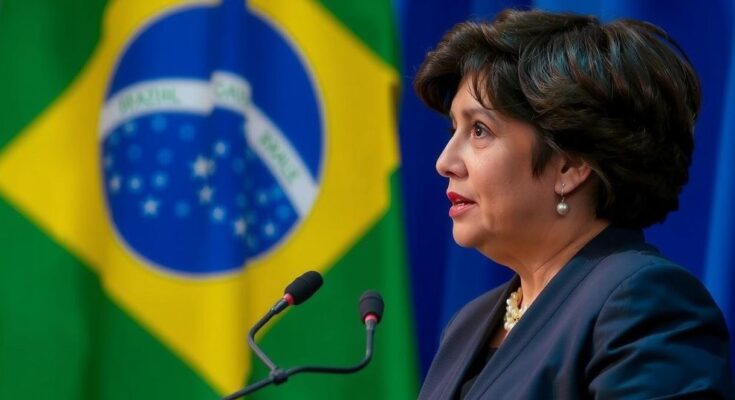Brazil’s Climate Change Minister, Marina Silva, criticized Argentina’s withdrawal from COP29, stating it undermines global climate efforts but will not disrupt ongoing negotiations for climate financing at the G20 Summit. Vice-President Alckmin expressed concern over the economic impacts of Milei’s stance and emphasized the role of science in addressing climate change.
On Thursday, Brazil’s Environment and Climate Change Minister, Marina Silva, condemned Argentina’s decision to withdraw its delegation from the Conference of Parties 29 (COP29) held in Baku, Azerbaijan, stating that it contradicts global efforts regarding climate change. Despite this setback, Silva believes that President Javier Milei’s actions will not derail ongoing negotiations focused on enhancing financial assistance from developed nations for the environmental adaptation of less developed countries. She emphasized that all nations bear the consequences of climate change, arguing that refusal to engage in international climate efforts exacerbates the crisis affecting lives and economies worldwide. Silva highlighted that the outcomes expected from the upcoming G20 Summit in Rio de Janeiro from November 18 to 19 would not be hampered by Milei’s decision. According to her, significant progress has already been made in discussions surrounding ecosystem service payments and taxation of the wealthy, indicating that the climate agenda has been effectively integrated with financial considerations. She stated, “The G20 has already made the progress we had hoped for. We were able to discuss everything from payment for ecosystem services to taxing the super-rich.” Vice-President Geraldo Alckmin echoed Silva’s concerns, lamenting Milei’s stance and reaffirming the role of science in human advancement. He pointed out that advancements in public health and medicine are testament to humanity’s reliance on scientific progress, stating, “Science is here to help humanity.” Alckmin also warned that the decision could negatively impact Argentina’s economy, potentially lowering the nation’s GDP. However, he maintained that governance relations should remain unaffected by individual decisions.
The recent statement from Brazil’s Climate Change Minister arises amidst ongoing international dialogues surrounding climate action and sustainability. COP29 is a pivotal global conference where nations gather to negotiate and establish frameworks aimed at combatting climate change, which has emerged as a pressing global challenge. Argentina’s withdrawal from these discussions reflects a broader trend of skepticism towards international climate agreements, which experts argue could hinder collective efforts to address environmental crises. Brazil’s leadership, particularly under the current administration, emphasizes the urgency of maintaining cooperative engagements in climate negotiations, highlighting the significant repercussions of climate change on societies and economies.
In summary, Brazil’s Environment and Climate Change Minister, Marina Silva, criticized Argentina’s withdrawal from COP29 as detrimental to global climate efforts but indicated that such a decision will not impede the essential negotiations for climate financing at the G20 Summit. Silva and Vice-President Alckmin both stressed the importance of scientific consensus in addressing climate issues and warned of potential economic ramifications for Argentina as a result of its current leadership’s stance. The situation underscores the critical need for continued international cooperation in tackling climate change.
Original Source: en.mercopress.com




